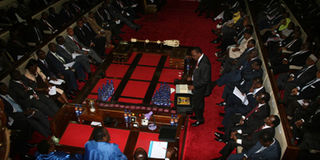Kenya's Budget for business

Deputy Prime Minister and Minister for Finance Uhuru Kenyatta presents the Budget at Parliament Old Chambers on June 10,2010. Photo/LIZ MUTHONI
Finance minister Uhuru Kenyatta on Thursday read a Budget that was generally short on intellectual fireworks but was quite clear in its intention — to give the private sector incentives to create more jobs and more tax revenues.
From small and medium enterprises, which he described in his budget speech on Thursday as the engine of economic growth and development, to big time manufacturers, the budget was spiced with policy measures aimed at raising productivity and improving the business climate to accelerate economic recovery.
Unlike in last year’s budget which put money in peoples pockets for consumption, this one encourages them to earn their keep by engaging in economic activities.
VAT refunds
Business got a reprieve from arbitrary charges levied by regulatory and local authorities, and this will get backing in the Business Regulation Bill to be tabled in Parliament soon. Besides, the sticky issue of VAT refunds, which tied up working capital for most businesses at Kenya Revenue Authority, has been addressed.
Business will now be paid genuine outstanding tax refund by end of July, and the process speeded up in future. And from July, 2010, all new claims that meet the low risk criteria will be paid within 120 days. “The overriding policy of the 2010/11 budget and the medium-term is to consolidate economic recovery and put the economy back onto a foundation of firm and sustainable growth path,” Mr Kenyatta said.
He said while investment in physical infrastructure had improved, the legal and regulatory environment still impeded business operations, thus scaring away potential investors and squeezing revenues for those in operation. “We require a business environment that’s at par with international best practice so that we can attract the requisite private investment,” he said.
He also pumped cash into improving security, giving the Ministry of State for Internal Security Sh2 billion more on top of its Sh46.3 billion allocation to finance the creation of a high-impact security intervention programme covering investments in operations and maintenance, communication, crime profiling and intelligence analysis to enhance security in urban centres and highways.
The minister also poured Sh182 billion in infrastructural development to ease transport costs for business and individuals, an increase of 20 per cent over the past year. “To continue with the ongoing road construction work and to demonstrate our commitment to scaling up investment in infrastructure so as to hasten economic recovery, I have allocated Sh78.6 billion to the subsector’s development budget,” some Sh20 billion more compared to the 2009/10 budget.
To ease the burden of high power costs, which account for almost 40 per cent of most business’ expenses, the government has increased its investment in alternative and green energy. Mr Uhuru said the Energy Regulatory Commission will revise its current formula for determining electricity tariffs to make movements in power costs predictable.
Even with a budget of Sh998.8 billion, the biggest in Kenya’s history, Mr Kenyatta spared most consumers tax increases, only raiding beer drinkers with a raise in tax on malt beer from Sh54 to Sh65 per litre and non-malt beer from Sh45 to Sh55 per litre. The minister hopes to raise Sh2.5 billion from the tax.
To boost rice and wheat supply, he reduced import duty on the two commodities from 35 to 10 per cent and 75 per cent to 35 per cent, respectively, for a year. Poultry farmers have something to smile about after chicken imported for breeding was exempted from duty.
Duty on cables, however, went up from 10 to 25 per cent to protect local manufacturers, while duty was removed from iron and alloy filters as well as petroleum ore, a raw material in the manufacture of cement. For property buyers, stamp duty penalty was cut from 25 per cent to 5 per cent of the principal amount to encourage uptake of land and houses, as that on mortgage reduced from 0.2 per cent to 0.1 per cent.
Drivers and conductors have a reprieve after they were exempted by advance tax payments to help them invest in insurance and save for retirement. Mr Kenyatta also moved to stimulate agriculture by promoting value-addition, research and re-introducing extension officers and easy credit, among other reforms, to increase output and income for farmers.
Farming now contributes 23 per cent of the country’s Sh2 trillion GDP, a drop from 24.5 per cent a year ago, mainly due to drought and the 2008 post-election violence. Young entrepreneurs also got a boost with the creation of a revolving fund of Sh3.8billion to provide cheaper credit for start-ups.
“Mr Speaker, we have about 8.3 million people working in the informal sector, of whom two million are in the jua kali industry and five million are kiosk owners, hawkers, mamambogas and those in the informal transport sector,” said Mr Uhuru. “Empowering this group through access to financial services that allow then to make bank deposits, save and earn interest to have access to credit would enable them to start and expand their businesses has the potential to reduce the twin problem of unemployment and poverty.
He gave another Sh2 billion each to free primary and secondary education, growing their budgets to Sh9.2 billion and Sh16.2 billion respectively. “In this regard ... free primary and education and free secondary tuition are fully financed,” he said. Kenyans expecting relief on the cost of living were handed a half empty glass by the budget, as Mr Kenyatta moved to massage the business community. Treasury projects revenues of Sh688.5 billion, or 24.9 per cent of GDP, comprising Sh609 billion of ordinary revenue and Sh78.9 billion of appropriation in aid.



